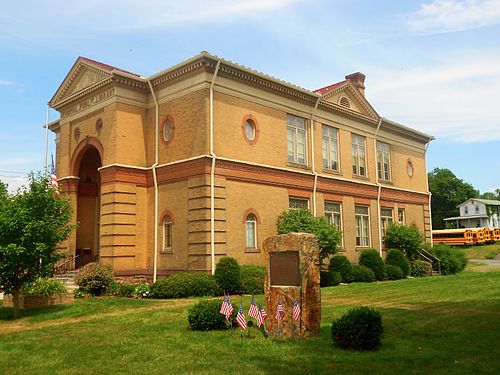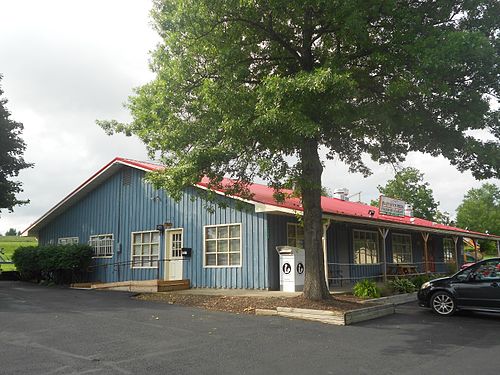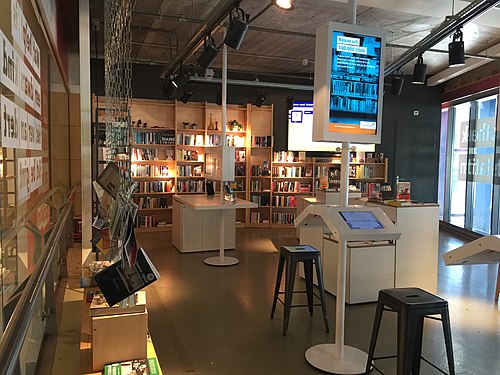Two photos of every library on earth
-
U.S.
-
Quebec
-
Iceland
-
Indonesia
- In last month's edition of this column, Vysotsky wrote about libraries and the joys of using photos of libraries that are available on Wikimedia Commons. I emailed him about the joys of contributing photos of libraries to Commons and about a project I've been thinking about for a long time. He invited me to write about it in Serendipity and helped choose some of the photos. He'll return next month. --S
Before the pandemic my favorite Wiki activity was taking photos of the small towns in Pennsylvania, especially in central Pennsylvania among the ridges and valleys of the Appalachian Mountains. In almost every small town, I’d park my car at either a church (except on Sundays) or a library. Both were easy to find: the churches have steeples, and libraries usually have road signs (like the ones above). They also usually have free parking and interesting photo opportunities. The libraries were usually the better places to take a break: cool water, clean restrooms, free wi-fi, helpful librarians. and sometimes books on local history. Libraries have done their part in spreading the sum of knowledge from even before the founding of the Library of Alexandria in the third century BC. There’s no better place for a Wikipedian than a library!
Some of my favorite spots are shown below. I never thought I’d run into the Library of Alexandria in a town of 388 people in Pennsylvania. The Halfmoon Township library in Centre County follows the practice of combining the library with the municipal offices, and in this case also includes a pizzeria. Closer to home, the Darby Free Library is one of several libraries that claims to be the "oldest public library in the US." It was founded in 1743 as a subscription library and didn’t become a true public library until 1898. The only building the library has ever owned was designed by a church architect and built in 1872. It looks very much like a church – so I was bound to stop there sooner or later. A Carnegie library is still operating in its original building in nearby Ridley Park.
-
The library of Alexandria, Pennsylvania
-
Borrow a book, pay your taxes, and grab a slice
-
The date stone above the rose window reads "Darby Library. 1743 1872"
-
The Carnegie library in Ridley Park
Last month’s Serendipity column by Vysotsky reminded me of my long held goal: Wikipedia should have at least one photo of every library in the world. Vysotsky insists we need two photos of each – one exterior, one interior. So be it. It won’t be much more difficult.
What good would the project do?
In general it would help illustrate articles on municipalities, universities, and other places. It would help our readers and Wikipedians find these cultural treasures near their homes as well as when they travel. In an age dominated by the Internet, it might help us all reconnect to the knowledge accumulated over the centuries in libraries.
What would we do with all those photos?
Library photos can often be appropriately added to articles on cities, towns, neighborhoods or other geographic areas. Others might be part of historic districts. Some folks might think that some areas have too many good photos already. But if these places really exist, they are overwhelmed worldwide by the number of cities and towns that have articles with no illustrations. Photos can also be added to list articles, such as List of public libraries in Delaware County, Pennsylvania or List of Carnegie libraries in Europe. Some might also be included in articles about universities, airports, or railway stations.
Shouldn’t we pick an easier goal? What's our plan?
Paraphrasing the great city planner and architect Daniel Burnham: "Make no little plans. They have no magic to stir our blood and probably will not themselves be realized." As part of Wikipedia, a project inspired by Jimmy Wales' exhortation to "imagine a world in which every single person on the planet is given free access to the sum of all human knowledge," we have no qualms about making big plans.
Of course we can prioritize: if we want to concentrate on public libraries first, that may be for the best. But nobody should turn away from a photo of a university library simply because it’s not open to the general public.
We have more specific plans, several, in fact, that can probably work together.
Plan A: Contact one or more librarians at every library and ask them to take a couple of photos next time they are at work. Contacting them through professional groups would be the most efficient method, either at the state, regional or national level. But if there is a glitch in that plan, individual Wikipedians can just contact their local libraries and ask the librarians directly.
Plan B: Of course Wikipedians can take photos themselves without asking a librarian. See if you can get a few pictures of every library within 20 miles of your home.
Plan C: there are many groups on Wikipedia like Wiki Loves Monuments and Wiki Loves Earth who have experience running photo contests. We can ask them for help, and local chapters and affiliates might also help.
Plan D: Put out the word on mass media and social media for help. We’re already exploring a social media campaign using the hashtag #1lib2pics.
No, we don’t have an organizational structure yet. Do you think we need one? Perhaps Plan A will work so well that we'll get photos of 90% of all libraries in just a few years. But if you are interested in helping to start an organization, or even in just taking a few photos, leave your user name in the comments section below, or email us at EmailUser/Smallbones or EmailUser/Vysotsky
Now back to the whole point of this article: photos of libraries. I’ve asked Vysotsky to help pick some outside of North America.
More favorite photos
-
Library at Rotterdam Central Station
-
15th century library in Braunschweig, Germany
-
Bibliotheque Nationale, Algiers
-
Balme Library, University of Ghana, 1950s
-
Johannesburg, New Library, South Africa. 1935
-
Stevenson-Hamilton Memorial Library in Skukuza, Kruger National Park, Mpumalanga, South Africa, 1960
-
Former Oakland, California Public Library
-
Old Jacksonville Free Public Library, Jacksonville, Florida
-
Carnegie library in Bryan, Texas
-
Montana State University library, 1904
-
Furness Library, University of Pennsylvania
-
Bowen Island Public Library, British Columbia
-
Richardson Library, St. Andrews University
-
National Railway Museum, York. U.K.

























Discuss this story
«In February 2020, a volunteer collected data from more than 8000 libraries in Spain and incorporated them into Wikidata. However, not all of them have a free photograph in Wikimedia Commons that can illustrate their item in Wikidata or their article in Wikipedia. The same happens with libraries around the world. Therefore, from Wikimedia Spain we launched the campaign No library without photography, with the aim of getting images of photographs of libraries under free license. Although it is aimed at the whole society, through it we want to involve especially librarians, as a way to approach the Wikimedia ecosystem and to participate in the dissemination of knowledge. In addition to creating a specific campaign in Commons, there is also the possibility of participating through the WikiShootMe! tool, where the libraries in Spain that do not yet have a photo are displayed, and uploading the images directly from there.» Information from: This Month in GLAM – Volume XII, Issue I, January 2022